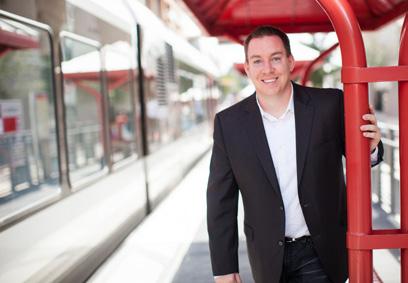
5 minute read
Your Wealth Building Journey Starts Now
Embrace financial freedom; it’s right within reach Ben Kinney, Co-Founder, PLACE
Although I am a PLACE co-founder and have launched multiple real estate companies, I am also someone who has known what it means to have little.
My parents separated when I was very young, and then my father raised me. We lived in a cabin without power or water, owned an outhouse, and relied on a food bank. These circumstances drove me to break the cycle of poverty in my family and then master wealth building.
The True Meaning Of Wealth
Finances have power over us and our relationships. We stress about them. We fight about them. And many times we fail to realize there’s a more active approach to money; we don’t have to just let it happen to us. There are a lot of beliefs floating around when it comes to money. Some people think wealth is bad, but I have a very simple take on it. To me, wealth is the ability to do WHAT I want, WHEN I want, and with WHOM I want. It is interconnected with freedom. People who live below their means enjoy a freedom that those who constantly seek to upgrade their lifestyle just don’t have. You, too, have the ability to be one of these people, as long as you reframe your former beliefs surrounding money. Here are some myths and facts that can help change the game:
Myth: My bills are covered; I’m good money-wise. Fact: You should make more money.
You might be thinking to yourself: “I’m good money-wise. I can pay my monthly bills. I’m comfortable. I don’t need more.” I can go through an entire list of people who felt the same way…until a loved one fell sick and everything changed. Feeling financially secure isn’t a lifelong guarantee, but you can surely be more confident in your financial future by always striving to make more money. Here are key reasons why this is important:
For emergencies: You or a loved one gets sick. A natural disaster hits. You get into a big accident. We all assume that everything we have and everything we’re doing is going to continue asis, but that’s not a realistic worldview. Things change, and they change quickly. And when they do, you need to be prepared.
For opportunities: According to Warren Buffet, the greatest distributions of wealth happen in down markets. Chaos creates opportunities. Will you have the opportunity to be in the game when the next financial crisis hits? Do you have the capital to take advantage of a buying opportunity when the market is down? Deploying capital during uncertain times creates a path to serious wealth building.
For leverage: When I was about 20 years old, I had zero money and a car clutch causing trouble. So, I went to my stepfather’s house to find tools, and spent the next five days figuring out how to replace the clutch. It would have made a world of a difference if I could have paid someone else to do it. Saving money isn’t always the secret. Sometimes you have to buy your time back.
For legacy: It can be leaving your assets behind for your family, supporting your community, or tackling humanitarian challenges — it is your driving force to make more money.
For memories and experiences: At the end of the day, making memories and sharing experiences with your loved ones is the most important part of life. And those experiences, more often than not, have a financial component attached.
Quick exercise: Jot down a paragraph about a time when not having money has affected or hurt you in each one of these areas.
Myth: Achieving wealth is too complicated.
Fact: With education and a shifting mindset, the sky’s the limit.
One of the biggest reasons people don’t achieve wealth is they think it’s unattainable and complicated. They may have negative emotions around money, or think that it’s about status. They may think having more money will make them more stressed. They may feel like there is a fixed amount of money out there and they’re waiting for someone or something — the government, an inheritance, a future husband or wife — to save them.
In reality, wealth is there for you. You just have to make it a priority, and just like any other goal, there are multiple ways to achieve it. You have to create a plan that’s right for you, stick with it, and stick with it long enough.
Wealth building is a process that grows incrementally. First, slowly, then faster and faster. But oftentimes, impatience, and focusing on the small pleasures of today, keep people from reaching their wealth potential. Let’s go back in time to 2001, when the iPod was released for $399. What if instead of buying the product, you had used that money to buy Apple stock? Today, that stock would be worth $58,000. Think about the Amazon items you buy on a daily basis. What if you bought the stock instead? Shift your mindset to choose later over now.
Recommended Exercise: Pledge to take 15 to 30 minutes of your day to focus on educating yourself instead of entertaining yourself. Between books, podcasts, and mentors — a slew of resources exists when it comes to wealth building. Imagine how much your bottom line would change by simply learning 15 minutes per day over the next year.
Myth: There are shortcuts to wealth building. Fact: For best results, I have to commit to the long game.
Short-term solutions aren’t real solutions. If you’re ready to change your life, commit to the long game. If you are ready to build your empire, phase out distractions and focus on seven steps that will completely change the game:
Reality check: Where are you on your financial journey? How much debt do you have? How much income? What’s the value of your assets, and what is your net worth?
Retirement check: Are you on track to retire? Do you know how much money you need for your retirement?
Saving up: Strategically reduce expenses and live on less. This will allow you to pay off debts and start saving.
Student of wealth: There are many concepts, equations, and models that can help you become wealthy. PLACE and the “Win Make Give” podcast are both fantastic resources.
Increasing income: Whether you work for a company or are self-employed, there are different strategies you can use for increasing your income.
Pay less: There are legal ways to pay fewer taxes. Learn them. Invest wisely: You have potential to see massive returns.
FINALLY, FLIP YOUR TRIANGLE
Ultimately, you want to be in a position where you’re not worrying about money, and instead are spending time thinking about making more money. Imagine that you have a triangle in front of you, divided into three pieces. The vast majority of the population exists at the base; their income is in direct relation to their salary. They exchange time for money.
Moving up to the middle of the triangle, there is cash flow. This is money earned from investments. Whether it be collecting interest on a loan or renting out one of your properties. People who reach this point can use cash flow to improve their lifestyle or use the money to buy more assets.
At the top of the triangle are assets and investments, and they contribute heavily to your net worth. What does flipping the triangle look like? In a perfect world, the base of the triangle would be filled with assets — real estate, stocks, bonds, cash, collectibles, and companies. These things must have tangible value, and they need to create cash flow. When you flip the triangle and add the value of your assets, it should be greater than that of your cash flow.
And in turn, that value should be greater than your income. Ultimately, when you retire and your income goes to zero, you will still be able to live comfortably.
Ben is a businessman, real estate agent, and bestselling author with offices throughout the United States, Canada, and the United Kingdom.
Subscribe To The Podcast
On my podcast, “Win Make Give,” we talk about wealth and financial freedom as part of the Wealth Series. With new content in 2023, the 16-part series will cover strategies that can help change your financial future. Sign up now at winmakegive.com/wealth for hard-hitting content and workbooks that will help you achieve your goals. Plus, one lucky winner will walk away with $10,000 to put toward building personal wealth.










